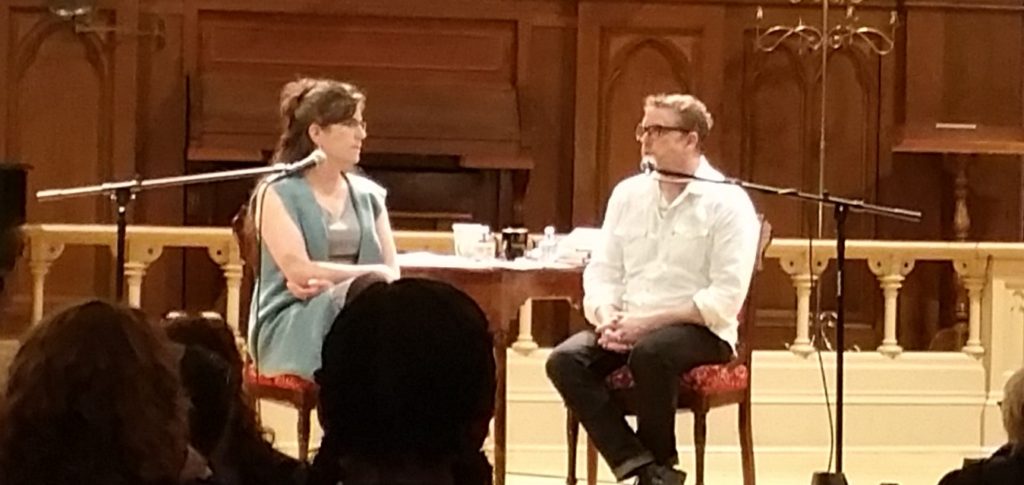Notes from the conversation between Kevin Sampsell A nd Monica Drake about leading a literary life at Willamette Writers Portland’s Monthly Meeting, February 07, 2017, by member Amy Foster Myer.
nd Monica Drake about leading a literary life at Willamette Writers Portland’s Monthly Meeting, February 07, 2017, by member Amy Foster Myer.
In the month’s meeting in Portland, Kevin Sampsell and Monica Drake touched on a subject close to the heart of many writers – leading a literary life and its very important cousin – being a good literary citizen.
Being a Good Literary Citizen
Being a good literary citizen is all about supporting other writers, buying their books, going to their readings, and cheering on the successes of each of our counterparts while working toward our own literary goals.
Both authors agreed that good writers must do these four things:
- Read – A LOT
- Be around other writers
- Go to Readings
- Participate in a literary community
Generating Rich Work – A Writer’s Life Can’t Be All Literary
Interestingly, another key aspect of being a writer is having plenty of things in your life that have nothing at all to do with writing. See Lorrie Moore’s story “How to be a Writer” for more.
As Monica explained, her life was full of all kinds of random jobs – animal behavior intern at the zoo, art gallery employee, office worker, clown (which directly influenced her novel Clown Girl) and more. Because of this rich range of job experiences, she can pull various details that lend her characters believability and authenticity.
This mirrors advice I once received from Portland author Vanessa Veselka, who said every writer must give him or herself permission to not write – i.e. to do other things that build the experiences that inform our writing. For instance, Vanessa once took off some number of months to work on a fishing boat in Alaska. She’s also a Kung Fu badass. She gives herself permission to take weeks and months away from the page to do the things that interest and intrigue her. And of course, that time ends up generating rich work.
Educating the Writer in You
Each author had very different experiences when it comes to education. with Monica completing a more traditional graduate program through the University of Arizona, while Kevin said he taught himself to write through reading.
Monica also got her start with Tom Spanbauer’s class, now titled Dangerous Writing. In general, writing workshops can be key to keeping a writer motivated, staying connected to a literary community, and finding support in that community.
In addition, community colleges offer a range of writing classes that are economical and a great opportunity for developing work. My current writing group came out of a Literary Arts class and I have been in other writing groups formed after Attic workshops and PCC community-ed workshops.
Advice on Getting in the Creative Mood
Monica shared that because she’s balancing so many responsibilities between parenting, teaching, and writing, she often stores quite a bit of material in her head and when she has a moment to write it down, she’ll do that.
She also expressed that having a deadline, such as the Willamette Writers’ meeting that very night, can be key to getting the writing going. In fact, the piece she read for us was written that day for this particular meeting.
Most writers agree that deadlines can be key to productivity, and this is another reason why being part of a critique group or signing up for a workshop can generate work.
Kevin also expressed that he has no set schedule. He balances two full-time jobs between his work at Powell’s and his press, and is also a collage artist, so he doesn’t always have a lot of time for writing.
However, on his days off, he’ll set aside 2-8 hours to dedicate to his writing.
Kevin also shared that he’s a very careful writer and will spend a long time thinking about the words before putting them on the page. The benefits are that the words tend to come out just as he wants them, with little revision necessary. He also expressed that his novel came out very quickly – written in about two years. He said that snippets and pieces would come to him and he’d bang out 1-2 pages in the 10 minutes before bed, accumulating a novel through that process.
Advice to Those Interested in the Publishing Life
As a publisher, Kevin shared some advice for those seeking work in the world of publishing.
There are many tracks to entering publishing.
One could do the traditional thing and move to New York and work one’s way up from reading slush, but that success could be found in other avenues.
For instance, in his work at Powell’s, he’s seen people start as cashiers, get promoted over a section, become the buyer for that section, and then move into the role of buyer for a large publisher. Great experience can be had working in bookstores, small presses, and magazines.
Finally, he said, you could always start your own press. Future Tense Books began as Kevin’s endeavor to see his own work in print, and then writers would come to him and say, “Can you help me get my book out?” This then led to being a publisher now listed on Lit Reactor’s site as the first small press publisher of note in Portland.
Read More
Click here to read the full meeting recap including links to writing workshops in Portland as well as more Q&A with Monica and Kevin where they touch on the advantages of publishing with the Big Five, publishing online, write life experiences vs. research and more.
If you like what you read, share it, thank Amy, and join us at another monthly meeting.
Thank you, Amy, for another meeting recap.
